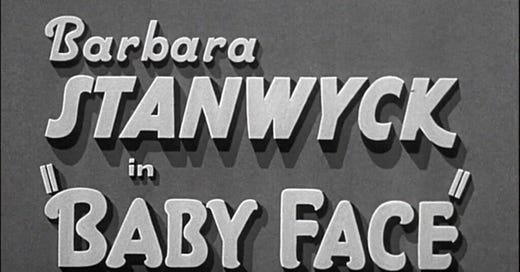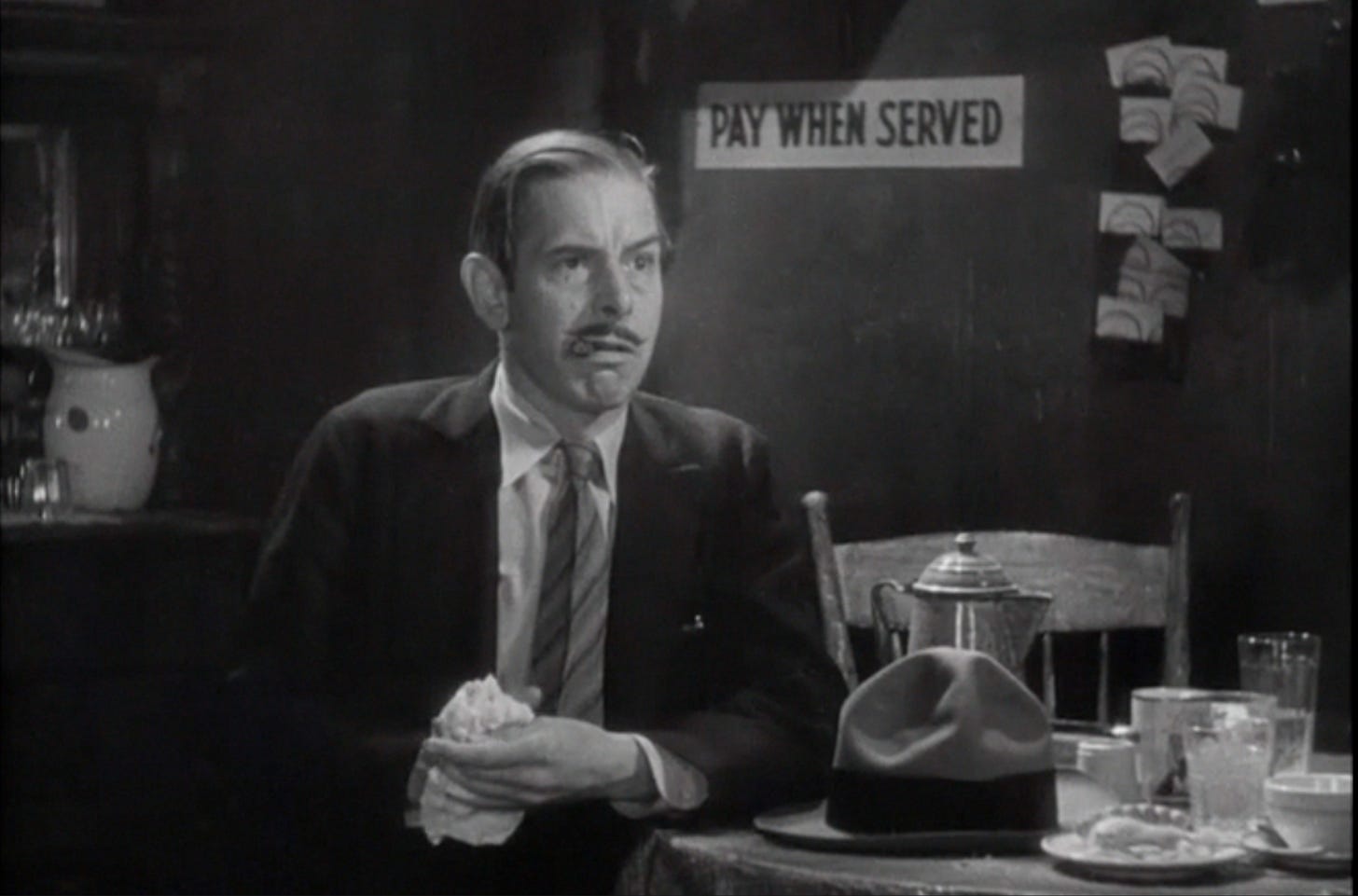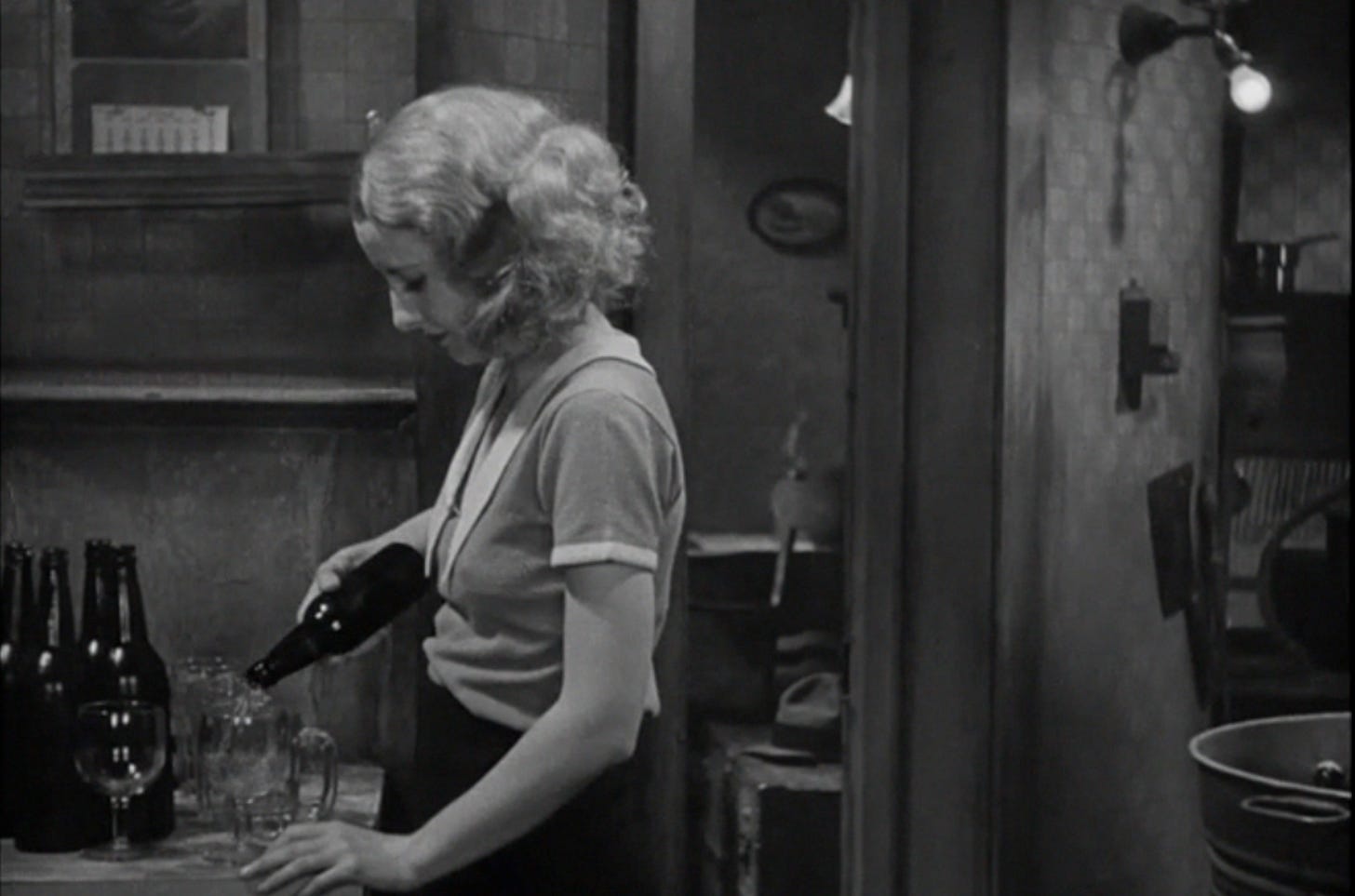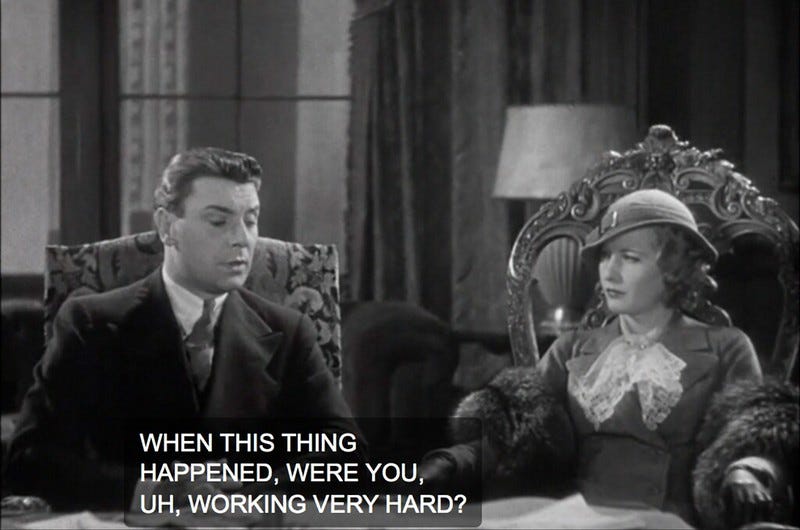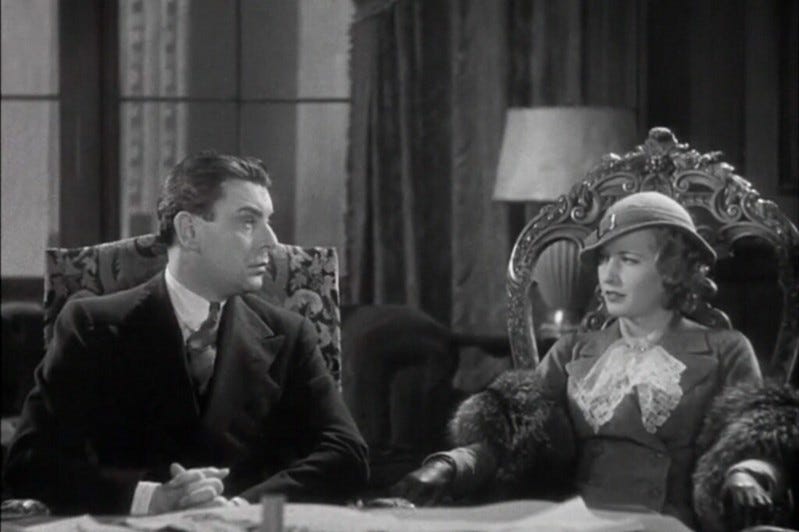Baby Face: The Pre-Codiest Pre-Code Movie of All Time
A Depression-era gem that feels right for the times
We’re delving into Pre-Code movies today with my personal favorite, Baby Face. Spoiler alerts, obviously. This movie, although almost 100 years old, was made and released at a time when nobody was really doing well (the Depression and all that) and I think that as very few of us are thriving right now it feels timely to re-visit things from dire times.
America in 1933 was in the early years of the Great Depression. That December, Prohibition would be repealed by the signing of the 21st Amendment. The country was thirsty, restless, and broke. Prohibition hadn’t worked for most people. The rich were able to stash away large amounts of liquor ahead of time, hoarding the good stuff and visiting embassies (technically foreign soil, thereby keeping full bars), while working-class folks went blind or died after drinking methanol-laced cocktails.
The deadly methanol often came courtesy of the US government, which purposefully denatured industrial alcohols to make them poisonous. By doing so, the American government killed thousands of her own citizens - but hey, they were mostly poor people, who weren’t good at pulling themselves up by their bootstraps. America has always relished dehumanizing and hating poor people, to the point that I would argue it is our national pastime (sorry baseball).
That year, the Civilian Conservation Corps was established and Machine Gun Kelly kidnapped an Oklahoma oilman and ransomed him for $200,000. The FDIC emerged in the wake of bank runs and people losing their life savings in a flash. (Keep on eye on it today - Trump is already messing around.) These were times of having nothing to lose, of mass migration, disaster, struggle, and enormous global and cultural shifts. Across the sea, Hitler was elected dictator and the Gestapo was formed, while the US formally started diplomatic relations with the fairly young USSR.
Distractions were welcome, and Hollywood knew just the thing: The Pre-Code movie. Seeing as times are a bit grim for most of us now, maybe make time to watch some of them and settle in for these marvelous time capsules that, though almost a century old, can feel incredibly relevant today.
Looking at the box office of 1933 tells us exactly the mood of the nation that year. Mae West’s innuendo-laced I’m No Angel was the second highest grossing movie of the year, while her other hit, She Done Him Wrong, rang in at number four. Gold Diggers of 1933 came in third. Jean Harlow, barely contained in bias cut silk, jiggled her way into the tenth highest grossing movie of the year in Dinner at Eight. I can think of nothing better than this Simpsons screenshot to illustrate the vibes - and Hollywood raked in millions with side-boob and fantasy.
In was in this ravenous, tumultuous time that Baby Face emerged. This movie is perhaps, as Karina Longworth refers to it, one of the “Pre-Codiest” of the Pre-Code movies that were made between 1929 and 1934. These movies were, as a rule, bawdy, lusty, unafraid of sex, inter-racial relationships, booze, extra-marital affairs, and other “vices”. The women were braless, lawless, and hungry. The men were dopey, violent, and deeply flawed. While these movies are highlighted with loud costumes (shout out to my favorite, Adrian) and over-the-top premises, humanity shines through if you look. Baby Face might be the least subtle of these movies, but I’ve watched it at least a dozen times and every time I find new things to relish.
Barbara Stanwyck plays Lily Powers, a young woman who works in her father’s speak-easy, while reluctantly engaging in sex work with the customers at her father’s aggressive and coercive urging. She’s motherless and almost totally friendless. The windows from the speakeasy show what looks like a filthy coal town with enough air pollution that she probably hasn’t seen the sun shine in some time. Her only girlfriend/ally in the entire movie is Chico, played by Theresa Harris, a Black woman. Chico sticks by Lily’s side for most of the movie, although Harris does not get nearly enough screen-time. She is absolutely magnetic and makes bounty with the few bits she gets.
This movie has scenes that you’ve probably seen in .gif form on Tumblr or Instagram. While Pre-Code movies are hilariously dated in some ways, in others they feel as fresh as ripe peaches. While working in her dad’s speakeasy, Lily fends off one greasy, wormy man’s advances by dumping boiling hot coffee on his creeping hand as it moves up her thigh. The man yelps and pulls away. She simpers, seemingly unharmed and utterly deadpan, “my hand shakes so around you”, and then proceeds to walk away and open herself a bottle of illicitly brewed beer. Eventually, he comes back (don’t they always?), and she calmly smashes a bottle over his head. How many of us would love the satisfaction of doing one or both things to the men who haven’t left us alone?
The loyalty that Lily shows to Chico and the way that she (mostly) treats her like a real human for a movie from 1933 also shores up how Pre-Code movies crossed boundaries. Lily’s father tries to throw Chico out of the house after Chico breaks something, and Lily yells, “If Chico goes I go!” This is not the only time Lily refuses to leave Chico behind in the movie.
Lily’s only other ally in her backwater town is a washed up yet highly intellectual German man with a regal walrus moustache who (while also not being a creep, a rarity for men in this movie) shows her a book by Nietzsche and how she needs to “use men” to get what she wants and get away. He insists she has power, something that she has obviously never heard in her life, and this concept immediately gives her pause.
Side note: I wish that more girls got this sort of talking to by people we admired - I really think that we would be better off. I was not really raised to believe I had power unless I followed every societal and moral rule to the letter. Just like the Great Depression showed our great grandparents that the systems then weren’t working, it’s been obvious to me since the economic crash of 2008, right before I went to college, that the systems and rules we are supposed to trust in and follow were never going to actually work for most of us. Where was my regally moustached man coming to tell me that I did, indeed, have power, and not just the meagre and often false kind earned by getting straight A’s and sucking up to shitty bosses?
After his impassioned monologue, Lily sits there, pulling on a cigarette, her cloche hat tilted jauntily, her mind turning. When her father dies shortly after in a still explosion, her opportunity to flee town with Chico arises. She watches the flames and the crowd that gathers around all with a grim look. Stanwyck’s acting abilities shine here: the way that she stares in a dead way, like a shark, calculating and vicious, is stunning. The jerk is dead, the door is open, the train yard close by.
Lily and Chico arrive in New York City (after Lily sleeps with the train car inspector so he wouldn’t kick them off). They have no money, no luggage, nothing but Lily’s willingness to use her body like a gold coin. She saunters by a skyscraper after Chico tells her how hungry she is. Stanwyck’s tiny frame and angular, bird-like profile make us believe that she herself is also starving.1 In her little home-sewn cotton dress and cloche hat, Lily flirts with a security guard and subsequent people until somebody gives her a chance and a job at a bank.
One of the best parts of the entire movie is as Lily sleeps with ever-more powerful men at the bank, the skyscraper she’s employed at is filmed from the outside. The camera pans up and up, hinting at her literal rise to new heights. While the camera moves vertically, ribald saxophones make it extra clear just how Lily is advancing. (Wink, wink.) Even better is that Lily clearly doesn’t care about how she is achieving this, and she is charismatic enough that we are absolutely rooting for her. It doesn’t hurt that the men she has sex with are mostly boors and losers (minus a really young cute John Wayne - oh my god).
Lily isn’t ashamed of her ability to seduce men. She also shows up to work on time, works hard, and learns fast at her job. She ignores the barbed comments by the women around her. The viewer also gets the hint that even though Chico is ultimately employed as Lily’s maid (boring, reductive) at the more and more luxurious apartments various men pay to keep them in, that Chico is also doing well and taken care of (fun, subversive).
In one scene, with Stanwyck resplendent in fur, Harris is also draped in matching fur, going away for Christmas. To see a beautiful, confident, glamorous Black woman draped in such luxurious clothes in 1933 feels radical and delightful. Perhaps this is Hollywood hinting that both women are unnatural, unusual beings in their own ways, but they are clearly having fun if they are. I wish that Harris had more chances to shine, and the writers give her some bad dialogue and do not flesh out her character nearly enough, but I loved seeing Chico be proud and beautiful when given the chance. She is Stanwyck’s only female ally and accomplice in the whole thing, and Harris shines doing so.
Theresa Harris unfortunately didn’t get big roles in her career. Val Lewton, one of the fathers of horror movies, cast her in multiple roles over the years. She was obviously talented, working alongside Jean Harlow, Ginger Rogers, and other Hollywood stars, but she wasn’t ever given the space to thrive and show off her skills.
When people think of old movies they might not think of movies where women get to transgress and revel in it to such an extent. Stanwyck looks positively gleeful tricking men into keeping her in enormous apartments and manipulating them to no end. The movie shows all the various things that she gets with her sexuality. Nice liquor, exquisite dresses, make-up, increasingly shellacked and styled hair. She gets sleeker, shinier, colder - a stone being faceted into a gem in front of our eyes. One clear way that the movie demonstrates her upward economic fortunes is also the most creative: her clothes.
The costumes Stanwyck wears in this movie are absolutely incredible. My personal favorites are at either end of Lily’s transformation. The first, when she’s still in coal country, is a casual long-collared shirt with a slim skirt that vintage lovers would pay good money to emulate today. The second, a backless, silk batwing gown she wears while entertaining one of her paramours, shows off Stanwyck’s beautiful posture and feline way of moving - a nod to her days as a Zeigfeld girl. In these two opposing screenshots, we can also see the helmet-like perm that Stanwyck’s character gets, and paired with the metallic thread and almost untouchable glamour and long sleeves of the gown, we see what amounts to armor. Orry-Kelly, who did the costumes for movies such as Casablanca, dressed Stanwyck so well here. She had a notoriously long torso that costume designers found difficult to work with, but Orry-Kelly makes her shine. Any vintage clothing lover will find so much to enjoy in this movie, from the use of lace to the cuts of necklines.
Eventually, Lily is caught up in a scandal that makes the papers, and is hush-hushed away to Paris to work for the bank there, out of sight and out of trouble. Here, away from New York and all the boors, with money and independence now hers, her fierce intelligence shines. She aggressively avoids men, chats amiably with clients, impresses her bosses, and seems satisfied. Then, of course, a decent man comes in. I won’t ruin it from there - I found the ending unsatisfying, but I don’t love the movie for the conclusion. That’s the thing about Pre-Code movies. They can be 90% sin, but they do, in order to be approved and shown in theaters, have to ultimately have their characters be redeemed, saved, or punished.
I have so much to say about Baby Face, mostly because Stanwyck is so satisfying in it. Even though she wasn’t thought of as conventionally gorgeous the way other Hollywood starlets were, she shines. In Baby Face, her eyes are bright and clever, her mouth snarls or smirks on a dime, and she sells you on the idea that she’s innocent even when you know she just can’t be, it’s too good to be true. She is slinky, sultry, and smarter than the men who up until recently kept her down. She makes it look so much fun to be bad, even when you know that the expiration date on her debauchery can’t be far ahead.
The screenplay was written by Kathryn Scola and Gene Markey. Scola wrote screeplays for other Pre-Code movies of the same caliber, which makes me want to watch them. A lot of the lines in Baby Face are perceptive of women’s experiences and frustrations in ways that feel wonderfully human, and I wonder if that’s present in other movies Scola worked on. Markey happened to be clever and desirable enough to marry not only Hedy Lamarr but also Myrna Loy, even though both women eventually divorced him. The dialogue the pair wrote is razor sharp, full of innuendo and insinuations, and none of the characters skip a beat understanding one another. This movie has layers! It’s complicated! It’s full of life, mistakes, traumatized people trying to make themselves new lives when everything is falling apart, and forgiveness.
Pre-Code movies were an ideal medium to push new and potentially transgressive ideas onto us. Because audiences weren’t supposed to take them super seriously, these movies could sneak in the good stuff. They let people root for nontraditional heroes and humanize people that in real life they might have demonized or stereotyped. Baby Face shows sex work, interracial friendships, ambitious women, and people who are working through horrors they didn’t ask to experience. It’s also, frankly, a gorgeous movie with elegant gowns and fantastic, playful 1930s clothes (the best era of clothing imo) and cutting dialogue. Let me know if you watch it, and what you think!
Stanwyck’s biography notes how she was a night club dancer before she got famous, and how she and her fellow dancers made so little money they’d go into diners and ask for a cup of hot water, and make tomato soup out of the hot water and free ketchup packets. Stanwyck absolutely knew hunger and struggle herself.

